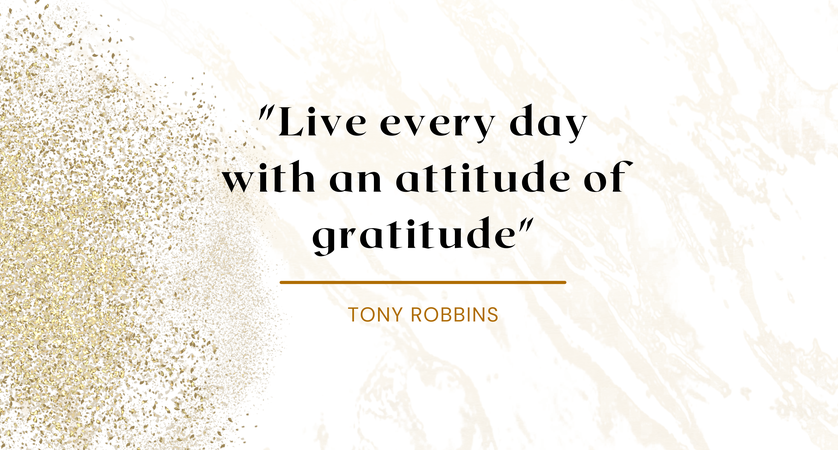It’s not just about counting your blessings, but also uncovering desirable paths towards exciting new opportunities, strengthening connections that enrich your existence, and discovering an ever greater amount of peace and contentment.
With gratitude and appreciation as our companions, we can approach everyday moments with a heart of joy that unlocks boundless potential.
In this beginner’s guide, we’ll explore what gratitude is, why it matters, and how it can help you live a happier, more fulfilling life.
From creative ways to express appreciation every day, tips for breaking out of negative thought patterns, and practical advice on how to become more grateful overall, this guide will provide you with the tools and insights you need to cultivate gratitude and experience the many benefits it has to offer.
So let’s dive in!
What is Gratitude and Why is it Important?
Gratitude is an emotion of appreciation and thankfulness. It’s like a warm fuzzy hug that envelops your heart when you reflect on all the good things in your life.
It is a mindset, a way of looking at the world with fresh eyes and an open heart. Gratitude gives us a sense of perspective, a way of stepping back from the chaos and focusing on all the wonderful things that make life worth living.
It is a simple yet powerful tool that can help you live a happier, more fulfilling life. At its core, gratitude is about focusing on the good things and appreciating them, rather than dwelling on the negatives.
But, it’s also about feeling appreciation for the challenges and failures that come your way, knowing that these experiences help you grow and learn. In short, it’s all about a shift in perspective – seeing the joy and beauty in everything, big or small.
The basics of gratitude involve cultivating a mindset of appreciation, a shift in your perspective. This can be as simple as taking a few moments each day to reflect on the things you’re grateful for, or it can involve more intentional practices like journaling or meditation.
The importance of gratitude cannot be overstated. Practicing gratitude regularly can have numerous benefits, including improving mental and physical health, increasing happiness and life satisfaction, reducing stress and anxiety, and even strengthening relationships.
So, why should we practice it regularly? Simply put, by regularly practicing gratitude we can train our brains to notice the positive aspects of life, even amid challenges and difficulties.
If you’re new to practicing gratitude, there are a few simple things you can do to get started. One popular technique is to keep a gratitude journal, where you write down a few things you’re grateful for each day.
Another option is to take a few minutes each day to reflect on the positive things in your life, or to express gratitude to the people around you. Whatever approach you choose, the key is to make gratitude a regular part of your life and to approach it with an open heart and a positive mind.

Benefits of Practicing Gratitude
Practicing gratitude has numerous benefits that can positively impact your life. Here are some of the benefits of regularly practicing gratitude:
- Increases Happiness:
Gratitude is a powerful emotion that can brighten up your life, making you happier and more fulfilled. Rather than worrying about what you lack, focus on what you have and feel content and satisfied.This simple shift of perspective can help you cultivate a positive outlook on life, which will increase your sense of happiness.
- Reduces Stress:
Gratitude has been shown to reduce stress levels by helping you focus on the positive aspects of your life. When you practice gratitude, you train your mind to look for the good in every situation, even challenging ones, which can help you cope with stress and anxiety. - Improves Relationships:
It’s also essential in cultivating and maintaining healthy relationships. It can help you feel more connected to people and the world around you. When you express appreciation towards others, it strengthens your bond and builds trust.Moreover, it can foster a sense of empathy and compassion towards others. In other words, a little gratitude goes a long way in making our connections healthy and happy!
- Boosts Self-Esteem:
Practicing gratitude can also improve your self-esteem. When you focus on the things you’re grateful for, you recognize your own worth and value in the world.It can help you realize that you are capable of achieving great things and have a lot to offer.
- Enhances Overall Well-being:
Gratitude does wonders for your overall well-being! It works by guiding your viewpoint from negative to positive and creating a feeling of abundance and fulfillment in your life that radiates positivity.
There are so many benefits to gratitude! Why not take just a moment each day to reflect on what you’re thankful for? Trust me, it can make all the difference!
7 Easy Ways to Start Practicing Gratitude
If you’re looking to start practicing gratitude but not sure where to begin, don’t worry, it’s easier than you think. Here are 6 easy ways to start practicing gratitude:
- Gratitude walks:
Take a walk in nature and make a conscious effort to appreciate the beauty around you. As you walk, give thanks for everything you see, from the trees and flowers to the sky and sun. - Gratitude jar:
Get a jar and some small pieces of paper. Each day, write down something you are grateful for and put it in the jar. At the end of the year, you will have a jar full of reminders of all the good things in your life. - Gratitude meditation:
Sit in a quiet place and take some deep breaths. Focus on the feeling of gratitude in your body and allow it to grow. Visualize all the things you are grateful for and feel the positive emotions that come with it. - Gratitude art:
Get creative and express your gratitude through art. Paint a picture or create a collage of all the things you are grateful for. - Gratitude ritual:
Make a habit of gratitude by creating a daily or weekly ritual. You can say a prayer of thanks before meals, give mental thanks for the company of loved ones, or spend a few minutes each morning jotting down what you’re thankful for.Doing this helps make gratitude a part of your routine and paves the way for a more positive outlook on life.
- Use visual reminders:
Place a visual reminder in a prominent location, like a sticky note or reminder on your phone, to remind you to practice gratitude. - Practice gratitude before bed:
Take some time to appreciate the good things in your life before bed: Reflect on what happened during your day and silently express your gratitude by saying “thank you.” It’ll help you sleep better and wake up with a smile in the morning!
These little acts of gratitude can make a big difference in both your life and others. So give them a try, your mind (and your mood) will thank you!
Connection Between Gratitude and Well-Being
Expressing gratitude has been found to have a strong connection with our overall sense of well-being. When we practice gratitude, we train our minds to focus on the positive aspects of life rather than dwelling on negative emotions and experiences.
This, in turn, can help reduce stress and let go of fear and doubt, while leading to an increased sense of happiness and contentment.
It’s important to remember that life is not perfect, and there will always be challenges and difficulties.
However, by focusing on the good things in life and expressing gratitude for them, we can shift our perspective and recognize that even amid challenging times, there are still things to be grateful for.
People who regularly practice gratitude report experiencing better sleep, increased levels of happiness, and improved overall well-being. So, even in difficult times, being able to feel gratitude and appreciation can help us stay grounded and hopeful.

Overcoming Obstacles to Gratitude
Gratitude is a powerful practice that can enhance your overall well-being and bring more positivity into your life.
However, like in any practice, there may be obstacles that hinder your ability to feel grateful. Here are some common barriers to gratitude and strategies for overcoming them.
- Negativity bias:
Our brains are wired to focus on negative experiences more than positive ones. This bias can make it challenging to feel grateful when negative experiences outweigh positive ones. - Entitlement:
When you feel like everything should be given to you, it might be tough to appreciate what you have and be thankful for it. Recognize what’s good in your life and be grateful for it. - Comparison:
Comparing yourself to others can make it challenging to feel grateful for what you have, especially if you believe others have it better than you. - Stress and anxiety:
Stress and anxiety can make it challenging to focus on the good in your life and instead cause you to dwell on negative experiences.
Strategies for overcoming these barriers
- Reframe negative experiences:
When you’re faced with negative experiences, try to look at them with a fresh pair of eyes. Instead of dwelling on the bad, take a moment to reflect on what you learned and how it helped you grow.This approach opens up opportunities for positivity and growth.
- Limit social media use:
Social media can be a breeding ground for comparison and feelings of inadequacy. Limiting your social media use can help you focus on the good in your life rather than comparing yourself to others. - Express gratitude regularly:
Expressing our appreciation regularly not only builds stronger relationships but also has the power to boost our overall well-being.When we show our sincere thankfulness for the people and things in our lives, it shifts our focus towards positivity, reminding us of all the good that exists.
Ways to Overcome Negative Feelings with Gratitude
Gratitude can be especially powerful in helping to overcome negative feelings such as anger, resentment, and jealousy. By focusing on the positive aspects of your life, you can shift your mindset and emotions toward a more positive and grateful state.
One effective way to do this is to practice reframing negative thoughts or situations into positive ones. For example, if you’re feeling resentful towards someone, try to focus on things that you appreciate about that person instead.
Another way to overcome negative feelings with gratitude is to use gratitude as a coping mechanism during difficult times. When facing a challenging situation, try to find things that you’re grateful for amid the struggle. This can help you maintain a sense of perspective and keep your spirits up, even when things seem tough.
Additionally, keeping a gratitude journal can be a helpful way to process negative emotions and find the good in difficult situations.
It’s important to note that practicing gratitude does not mean ignoring or suppressing negative emotions. Rather, it’s about acknowledging and accepting those emotions while also recognizing the positive aspects of your life.
By doing so, you can cultivate a sense of resilience and emotional strength that can help you navigate life’s ups and downs with greater ease and grace.

Cultivating a Gratitude Mindset
Gratitude is a powerful emotion that can improve our lives in many ways. One way to make gratitude a part of our daily lives is by cultivating a gratitude mindset.
This means actively seeking out things to be thankful for and focusing on the positive aspects of our lives.
How to Show Gratitude in Your Everyday Life
One of the best ways to cultivate a gratitude mindset is by showing appreciation for the people and things in our lives. This can be as simple as saying “thank you” when someone does something kind for us or taking a moment to appreciate the beauty of nature.
It’s important to remember that gratitude doesn’t have to be grand gestures or big moments, but can be found in the small things in our daily lives.
Developing a Gratitude Habit
To truly cultivate a gratitude mindset, it’s important to develop a gratitude habit. This means intentionally making gratitude a regular part of our daily routine.
One way to do this is by keeping a gratitude journal, where we write down a few things we’re grateful for each day. Another way is to set a reminder on our phone or calendar to take a moment each day to reflect on what we’re thankful for.
An Example of Gratitude
Showing appreciation for the people in our lives is an excellent example of gratitude in action. A quick text or phone call can go a long way in letting someone know you’re grateful for them.
It’s important to appreciate not only what others do for us but also who they are as individuals. By focusing on their positive qualities, we enhance the sense of gratitude and connection we share with those around us.
Final Thoughts
Gratitude is a powerful tool that can transform our lives for the better. It is a simple but profound practice that can help us to appreciate the good things in life and cultivate a positive mindset.
By practicing gratitude regularly, we can shift our focus from what we lack to what we have, and find joy and contentment in the present moment.
Whether you choose to keep a gratitude journal, practice gratitude meditation, or simply make a habit of expressing gratitude to the people in your life, incorporating gratitude into your daily routine can have a profound impact on your overall well-being.
Remember, gratitude is not just a one-time event or a quick fix for negative emotions. It is a lifelong practice that requires consistent effort and intention. As you continue to cultivate a gratitude mindset, you will likely find that the practice becomes easier and more natural over time, and that you experience greater levels of happiness and fulfillment as a result.
So take a moment to reflect on the good things in your life, and make a conscious effort to express gratitude for them. Whether it’s a small gesture of kindness from a stranger or a major accomplishment that you’ve achieved, there is always something to be thankful for.
By focusing on the positive and cultivating a gratitude mindset, you can create a happier, more fulfilling life for yourself and those around you.


0 Comments